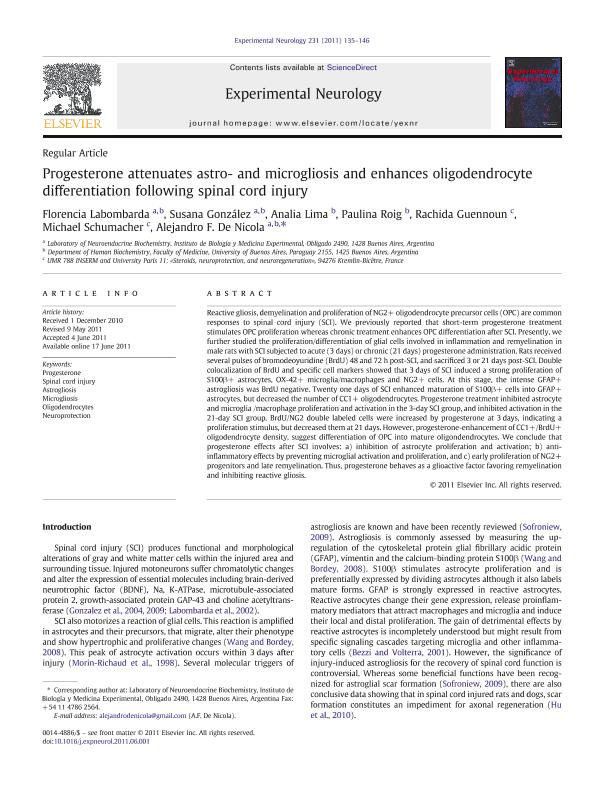Artículo
Progesterone attenuates astro and microgliosis and enhances oligodendrocyte differentittion following spinal cord injury
Labombarda, Maria Florencia ; Gonzalez, Susana Laura
; Gonzalez, Susana Laura ; Lima, Analia Ethel
; Lima, Analia Ethel ; Roig, Paulina
; Roig, Paulina ; Gennoun, Rachida; Schumacher, Michael; de Nicola, Alejandro Federico
; Gennoun, Rachida; Schumacher, Michael; de Nicola, Alejandro Federico
 ; Gonzalez, Susana Laura
; Gonzalez, Susana Laura ; Lima, Analia Ethel
; Lima, Analia Ethel ; Roig, Paulina
; Roig, Paulina ; Gennoun, Rachida; Schumacher, Michael; de Nicola, Alejandro Federico
; Gennoun, Rachida; Schumacher, Michael; de Nicola, Alejandro Federico
Fecha de publicación:
09/2011
Editorial:
Elsevier Inc
Revista:
Experimental Neurology
ISSN:
0014-4886
e-ISSN:
1090-2430
Idioma:
Inglés
Tipo de recurso:
Artículo publicado
Clasificación temática:
Resumen
Reactive gliosis, demyelination and proliferation of NG2+ oligodendrocyte precursor cells (OPC) are common responses to spinal cord injury (SCI). We previously reported that short-term progesterone treatment stimulates OPC proliferation whereas chronic treatment enhances OPC differentiation after SCI. Presently, we further studied the proliferation/differentiation of glial cells involved in inflammation and remyelination in male rats with SCI subjected to acute (3 days) or chronic (21 days) progesterone administration. Rats received several pulses of bromodeoyuridine (BrdU) 48 and 72 h post-SCI, and sacrificed 3 or 21 days post-SCI. Double colocalization of BrdU and specific cell markers showed that 3 days of SCI induced a strong proliferation of S100β+ astrocytes, OX-42+ microglia/macrophages and NG2+ cells. At this stage, the intense GFAP+ astrogliosis was BrdU negative. Twenty one days of SCI enhanced maturation of S100β+ cells into GFAP+ astrocytes, but decreased the number of CC1+ oligodendrocytes. Progesterone treatment inhibited astrocyte and microglia /macrophage proliferation and activation in the 3-day SCI group, and inhibited activation in the 21-day SCI group. BrdU/NG2 double labeled cells were increased by progesterone at 3 days, indicating a proliferation stimulus, but decreased them at 21 days. However, progesterone-enhancement of CC1+/BrdU+ oligodendrocyte density, suggest differentiation of OPC into mature oligondendrocytes. We conclude that progesterone effects after SCI involves: a) inhibition of astrocyte proliferation and activation; b) anti-inflammatory effects by preventing microglial activation and proliferation, and c) early proliferation of NG2+ progenitors and late remyelination. Thus, progesterone behaves as a glioactive factor favoring remyelination and inhibiting reactive gliosis.
Palabras clave:
Progesterone
,
Spinal Cord Injuries
,
Reactive Gliosis
,
Oligodendroglia
,
Microglia
Archivos asociados
Licencia
Identificadores
Colecciones
Articulos(IBYME)
Articulos de INST.DE BIOLOGIA Y MEDICINA EXPERIMENTAL (I)
Articulos de INST.DE BIOLOGIA Y MEDICINA EXPERIMENTAL (I)
Citación
Labombarda, Maria Florencia; Gonzalez, Susana Laura; Lima, Analia Ethel; Roig, Paulina; Gennoun, Rachida; et al.; Progesterone attenuates astro and microgliosis and enhances oligodendrocyte differentittion following spinal cord injury; Elsevier Inc; Experimental Neurology; 231; 1; 9-2011; 135-146
Compartir
Altmétricas



